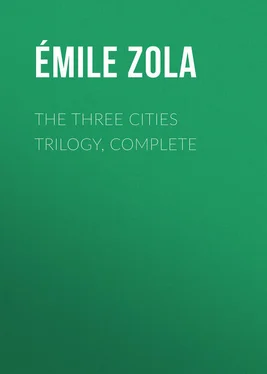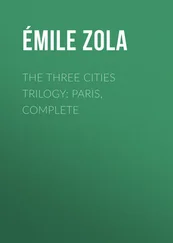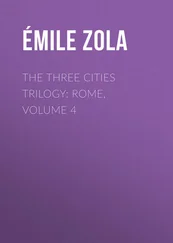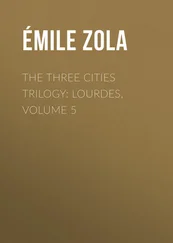Émile Zola - The Three Cities Trilogy, Complete
Здесь есть возможность читать онлайн «Émile Zola - The Three Cities Trilogy, Complete» — ознакомительный отрывок электронной книги совершенно бесплатно, а после прочтения отрывка купить полную версию. В некоторых случаях можно слушать аудио, скачать через торрент в формате fb2 и присутствует краткое содержание. Жанр: literature_19, foreign_antique, foreign_prose, на английском языке. Описание произведения, (предисловие) а так же отзывы посетителей доступны на портале библиотеки ЛибКат.
- Название:The Three Cities Trilogy, Complete
- Автор:
- Жанр:
- Год:неизвестен
- ISBN:нет данных
- Рейтинг книги:5 / 5. Голосов: 1
-
Избранное:Добавить в избранное
- Отзывы:
-
Ваша оценка:
- 100
- 1
- 2
- 3
- 4
- 5
The Three Cities Trilogy, Complete: краткое содержание, описание и аннотация
Предлагаем к чтению аннотацию, описание, краткое содержание или предисловие (зависит от того, что написал сам автор книги «The Three Cities Trilogy, Complete»). Если вы не нашли необходимую информацию о книге — напишите в комментариях, мы постараемся отыскать её.
The Three Cities Trilogy, Complete — читать онлайн ознакомительный отрывок
Ниже представлен текст книги, разбитый по страницам. Система сохранения места последней прочитанной страницы, позволяет с удобством читать онлайн бесплатно книгу «The Three Cities Trilogy, Complete», без необходимости каждый раз заново искать на чём Вы остановились. Поставьте закладку, и сможете в любой момент перейти на страницу, на которой закончили чтение.
Интервал:
Закладка:
“Oh no! hardly that. An unoccupied room, and yet in truth, if you insist on it, it is a lumber-room!”
His uneasiness was increasing, mingled with a little shame. Doctor Chassaigne remained silent and did not interfere; but he smiled, and was visibly delighted at his companion’s revolt against human ingratitude. Pierre, unable to restrain himself, now continued: “You must excuse me, Monsieur l’Abbe, if I insist. But just reflect that you owe everything to Bernadette; but for her Lourdes would still be one of the least known towns of France. And really it seems to me that out of mere gratitude the parish ought to have transformed this wretched room into a chapel.”
“Oh! a chapel!” interrupted the curate. “It is only a question of a human creature: the Church could not make her an object of worship.”
“Well, we won’t say a chapel, then; but at all events there ought to be some lights and flowers – bouquets of roses constantly renewed by the piety of the inhabitants and the pilgrims. In a word, I should like some little show of affection – a touching souvenir, a picture of Bernadette – something that would delicately indicate that she deserves to have a place in all hearts. This forgetfulness and desertion are shocking. It is monstrous that so much dirt should have been allowed to accumulate!”
The curate, a poor, thoughtless, nervous man, at once adopted Pierre’s views: “In reality, you are a thousand times right,” said he; “but I myself have no power, I can do nothing. Whenever they ask me for the room, to set it to rights, I will give it up and remove my barrels, although I really don’t know where else to put them. Only, I repeat, it does not depend on me. I can do nothing, nothing at all!” Then, under the pretext that he had to go out, he hastened to take leave and run away again, saying to Doctor Chassaigne: “Remain, remain as long as you please; you are never in my way.”
When the doctor once more found himself alone with Pierre he caught hold of both his hands with effusive delight. “Ah, my dear child,” said he, “how pleased you have made me! How admirably you expressed to him all that has been boiling in my own heart so long! Like you, I thought of bringing some roses here every morning. I should have simply had the room cleaned, and would have contented myself with placing two large bunches of roses on the mantelpiece; for you know that I have long felt deep affection for Bernadette, and it seemed to me that those roses would be like the very flowering and perfume of her memory. Only – only – ” and so saying he made a despairing gesture, “only courage failed me. Yes, I say courage, no one having yet dared to declare himself openly against the Fathers of the Grotto. One hesitates and recoils in the fear of stirring up a religious scandal. Fancy what a deplorable racket all this would create. And so those who are as indignant as I am are reduced to the necessity of holding their tongues – preferring a continuance of silence to anything else.” Then, by way of conclusion, he added: “The ingratitude and rapacity of man, my dear child, are sad things to see. Each time I come into this dim wretchedness, my heart swells and I cannot restrain my tears.”
He ceased speaking, and neither of them said another word, both being overcome by the extreme melancholy which the surroundings fostered. They were steeped in gloom. The dampness made them shudder as they stood there amidst the dilapidated walls and the dust of the old rubbish piled upon either side. And the idea returned to them that without Bernadette none of the prodigies which had made Lourdes a town unique in the world would have existed. It was at her voice that the miraculous spring had gushed forth, that the Grotto, bright with candles, had opened. Immense works were executed, new churches rose from the ground, giant-like causeways led up to God. An entire new city was built, as if by enchantment, with gardens, walks, quays, bridges, shops, and hotels. And people from the uttermost parts of the earth flocked thither in crowds, and the rain of millions fell with such force and so abundantly that the young city seemed likely to increase indefinitely – to fill the whole valley, from one to the other end of the mountains. If Bernadette had been suppressed none of those things would have existed, the extraordinary story would have relapsed into nothingness, old unknown Lourdes would still have been plunged in the sleep of ages at the foot of its castle. Bernadette was the sole labourer and creatress; and yet this room, whence she had set out on the day she beheld the Virgin, this cradle, indeed, of the miracle and of all the marvellous fortune of the town, was disdained, left a prey to vermin, good only for a lumber-room, where onions and empty barrels were put away.
Then the other side of the question vividly appeared in Pierre’s mind, and he again seemed to see the triumph which he had just witnessed, the exaltation of the Grotto and Basilica, while Marie, dragging her little car, ascended behind the Blessed Sacrament, amidst the clamour of the multitude. But the Grotto especially shone out before him. It was no longer the wild, rocky cavity before which the child had formerly knelt on the deserted bank of the torrent; it was a chapel, transformed and enriched, a chapel illumined by a vast number of candles, where nations marched past in procession. All the noise, all the brightness, all the adoration, all the money, burst forth there in a splendour of constant victory. Here, at the cradle, in this dark, icy hole, there was not a soul, not a taper, not a hymn, not a flower. Of the infrequent visitors who came thither, none knelt or prayed. All that a few tender-hearted pilgrims had done in their desire to carry away a souvenir had been to reduce to dust, between their fingers, the half-rotten plank serving as a mantelshelf. The clergy ignored the existence of this spot of misery, which the processions ought to have visited as they might visit a station of glory. It was there that the poor child had begun her dream, one cold night, lying in bed between her two sisters, and seized with a fit of her ailment while the whole family was fast asleep. It was thence, too, that she had set out, unconsciously carrying along with her that dream, which was again to be born within her in the broad daylight and to flower so prettily in a vision such as those of the legends. And no one now followed in her footsteps. The manger was forgotten, and left in darkness – that manger where had germed the little humble seed which over yonder was now yielding such prodigious harvests, reaped by the workmen of the last hour amidst the sovereign pomp of ceremonies.
Pierre, whom the great human emotion of the story moved to tears, at last summed up his thoughts in three words, saying in a low voice, “It is Bethlehem.”
“Yes,” remarked Doctor Chassaigne, in his turn, “it is the wretched lodging, the chance refuge, where new religions are born of suffering and pity. And at times I ask myself if all is not better thus: if it is not better that this room should remain in its actual state of wretchedness and abandonment. It seems to me that Bernadette has nothing to lose by it, for I love her all the more when I come to spend an hour here.”
He again became silent, and then made a gesture of revolt: “But no, no! I cannot forgive it – this ingratitude sets me beside myself. I told you I was convinced that Bernadette had freely gone to cloister herself at Nevers. But although no one smuggled her away, what a relief it was for those whom she had begun to inconvenience here! And they are the same men, so anxious to be the absolute masters, who at the present time endeavour by all possible means to wrap her memory in silence. Ah! my dear child, if I were to tell you all!”
Little by little he spoke out and relieved himself. Those Fathers of the Grotto, who showed such greed in trading on the work of Bernadette, dreaded her still more now that she was dead than they had done whilst she was alive. So long as she had lived, their great terror had assuredly been that she might return to Lourdes to claim a portion of the spoil; and her humility alone reassured them, for she was in nowise of a domineering disposition, and had herself chosen the dim abode of renunciation where she was destined to pass away. But at present their fears had increased at the idea that a will other than theirs might bring the relics of the visionary back to Lourdes; that, thought had, indeed, occurred to the municipal council immediately after her death; the town had wished to raise a tomb, and there had been talk of opening a subscription. The Sisters of Nevers, however, formally refused to give up the body, which they said belonged to them. Everyone felt that the Sisters were acting under the influence of the Fathers, who were very uneasy, and energetically bestirred themselves to prevent by all means in their power the return of those venerated ashes, in whose presence at Lourdes they foresaw a possible competition with the Grotto itself. Could they have imagined some such threatening occurrence as this – a monumental tomb in the cemetery, pilgrims proceeding thither in procession, the sick feverishly kissing the marble, and miracles being worked there amidst a holy fervour? This would have been disastrous rivalry, a certain displacement of all the present devotion and prodigies. And the great, the sole fear, still and ever returned to them, that of having to divide the spoils, of seeing the money go elsewhere should the town, now taught by experience, know how to turn the tomb to account.
Читать дальшеИнтервал:
Закладка:
Похожие книги на «The Three Cities Trilogy, Complete»
Представляем Вашему вниманию похожие книги на «The Three Cities Trilogy, Complete» списком для выбора. Мы отобрали схожую по названию и смыслу литературу в надежде предоставить читателям больше вариантов отыскать новые, интересные, ещё непрочитанные произведения.
Обсуждение, отзывы о книге «The Three Cities Trilogy, Complete» и просто собственные мнения читателей. Оставьте ваши комментарии, напишите, что Вы думаете о произведении, его смысле или главных героях. Укажите что конкретно понравилось, а что нет, и почему Вы так считаете.












